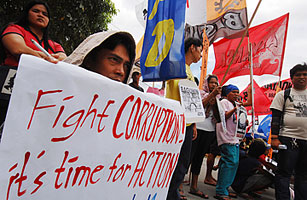
Anti-Arroyo protestors rally outside the senate while Rodolfo Lozada, a key witness in the corruption probe, testifies during the senate hearing in Manila on Feb. 18, 2008
As Asia marches forward, as some of its nations join the industrial world, and as others, although still young, establish themselves among the globe's economic and political elite, the world watches in bewildering awe the continent which it once had tagged as the Third World. There is no doubt, therefore, that the coming decade will be Asia's. In fact, it might not be an exaggeration to say that this entire century will be Asia's. But amidst all this glory, as is the case with every transition, there are certain obstacles that can severely stymie the continent's progress and must be removed before anything more complex is to be achieved. I am, of course, talking about those problems that the developing part of Asia is still dealing with.
Quite surprisingly, while some nations such as Japan, Singapore and South Korea have been successful in ascending to First World resplendency, there still are nations in the continent that are struggling with dithering political regimes, rampant corruption, poverty, hunger and malnutrition, poor healthcare, illiteracy, and internal instabilities — all the characteristics that are unacceptable if the goal is comprehensive development. There are yet others (such as India) which, despite robust economic growth, stable governments and noble government intentions, still remain unsuccessful in providing basic sustenance to a large part of their population, again perhaps because of the transitory corruption that has permeated the system. Then there is also the issue of energy security in a ruthlessly energy hungry, oil devouring economic environment under the threat of an imminent energy crisis and amidst increasing pressure from nature and the international community to go green.
The challenges, as we can see, are many, and therefore, in my view, to think of the problems in terms of a "one greatest challenge" is to disregard the other equally significant challenges as unimportant. It is also futile to target them one at a time just for the sake of correcting unpleasant statistics, as these problems are, and have invariably been, inherently interconnected. And so, what we need as a continent are not small and superficial remedies but a single holistic solution that incorporates all aspects of all our problems. However romantically promising a holistic solution still eludes our policy makers, perhaps because it is too theoretical and idealistic. To make things easier for our continent's leaders, it is, then, only wise to break down these problems to the most fundamental and come up with the 'most' holistic solution.
Upon doing so, I believe the basic problem because of which most of our progress (especially economic) is hindered is still the problem of governance. Without good governance, all policies, plans or solutions are redundant. The biggest hurdle in the way of good governance is corruption, as it is, undoubtedly, the direct and indirect cause of almost the entire spectrum of our problems such as poverty, terrorism, illiteracy, poor infrastructure and others, which probably, in its absence, could have been solved by now. On the domestic level, therefore, besides increasing the efficiency of our countries' government machinery, our primary aim must be to develop an effective framework for tackling the governmental menace of corruption. Furthermore, on a more bigger and broader scale and in view of a more general and long- term picture of Asia, our leaders must also make efforts to produce a peaceful political environment in Asia by attaining greater political stability in tense regions such as Burma, Afghanistan, Pakistan and the Middle East so as to make these regions economically stable and reliable and capable of a more active participation in our economic environment. Without it, nothing greater can be expected of them and the economic potential of regional integration and cooperation cannot be fully realized. Not only that, we will need all the help we can get from these nations in tackling the harsher challenges that await us.
I admit that in the midst of immensely pressing issues like global warming, energy security, and sustainable development, what I have proposed is a rather dry diagnosis, but alas, as with every task, I believe it is the dull part that ought to be dealt with first, especially in Asia where it can prove to be a huge hindrance in the future. The premise is as simple as it can get: if the foundation is solid, the building will stand.